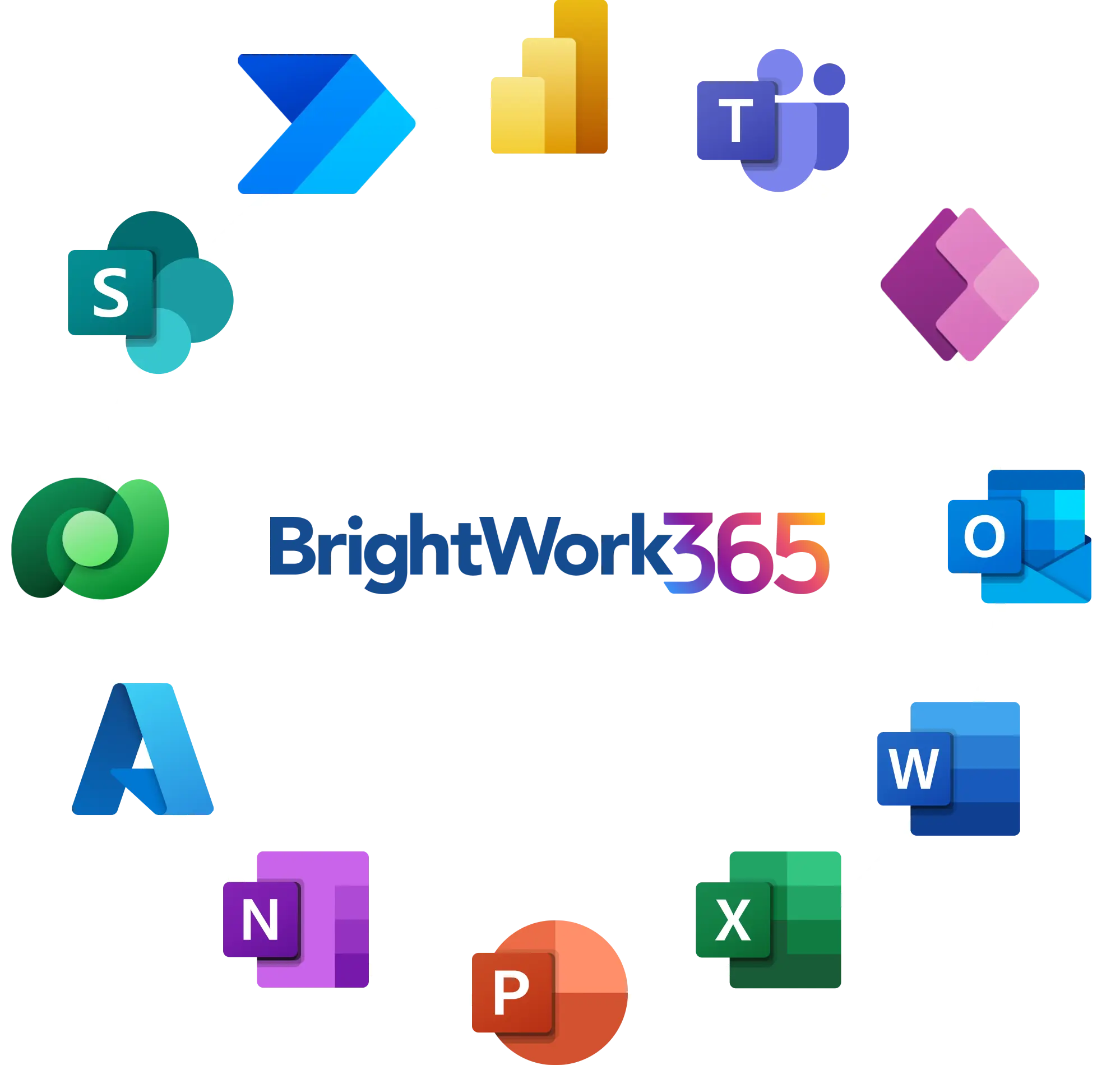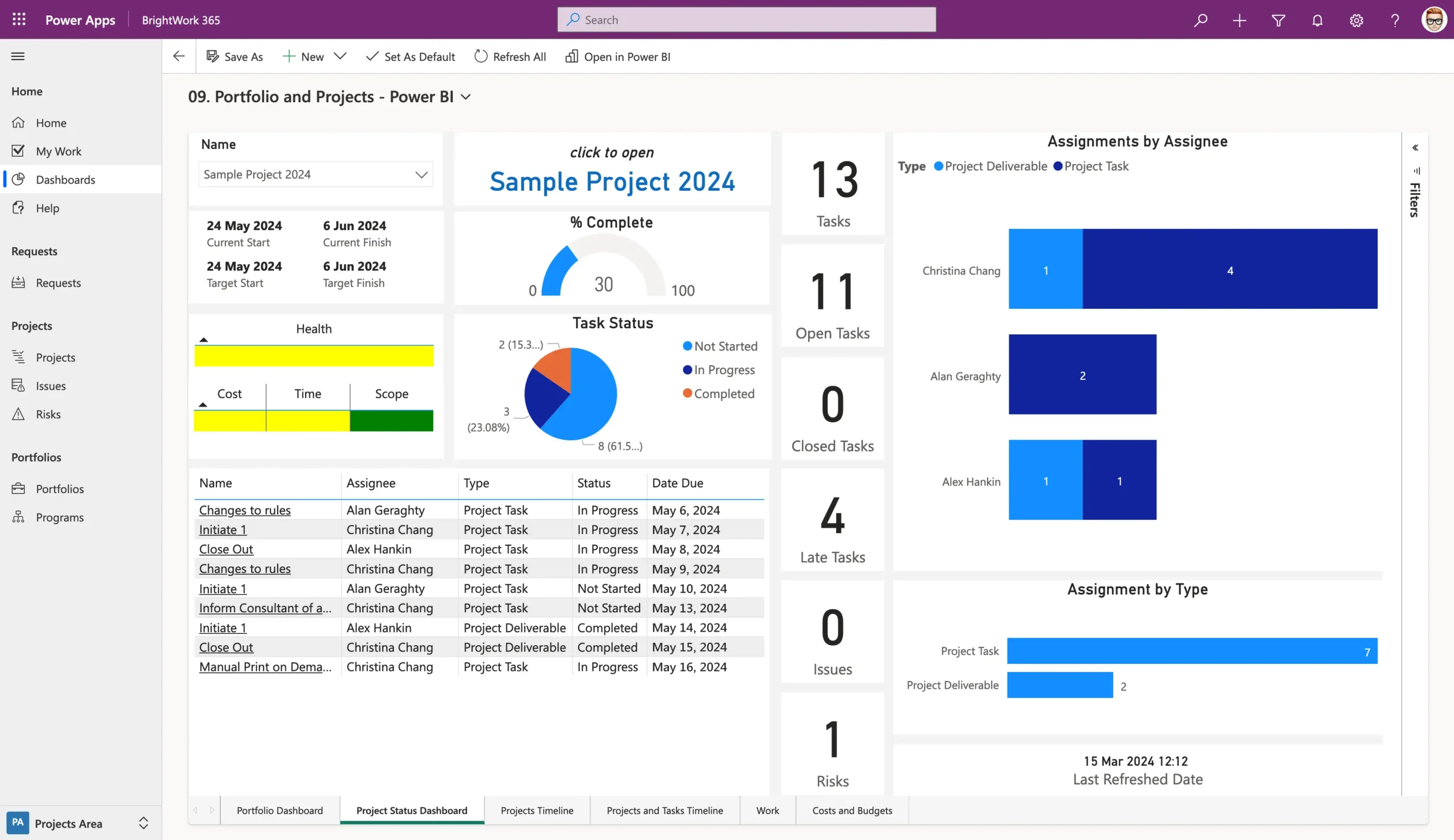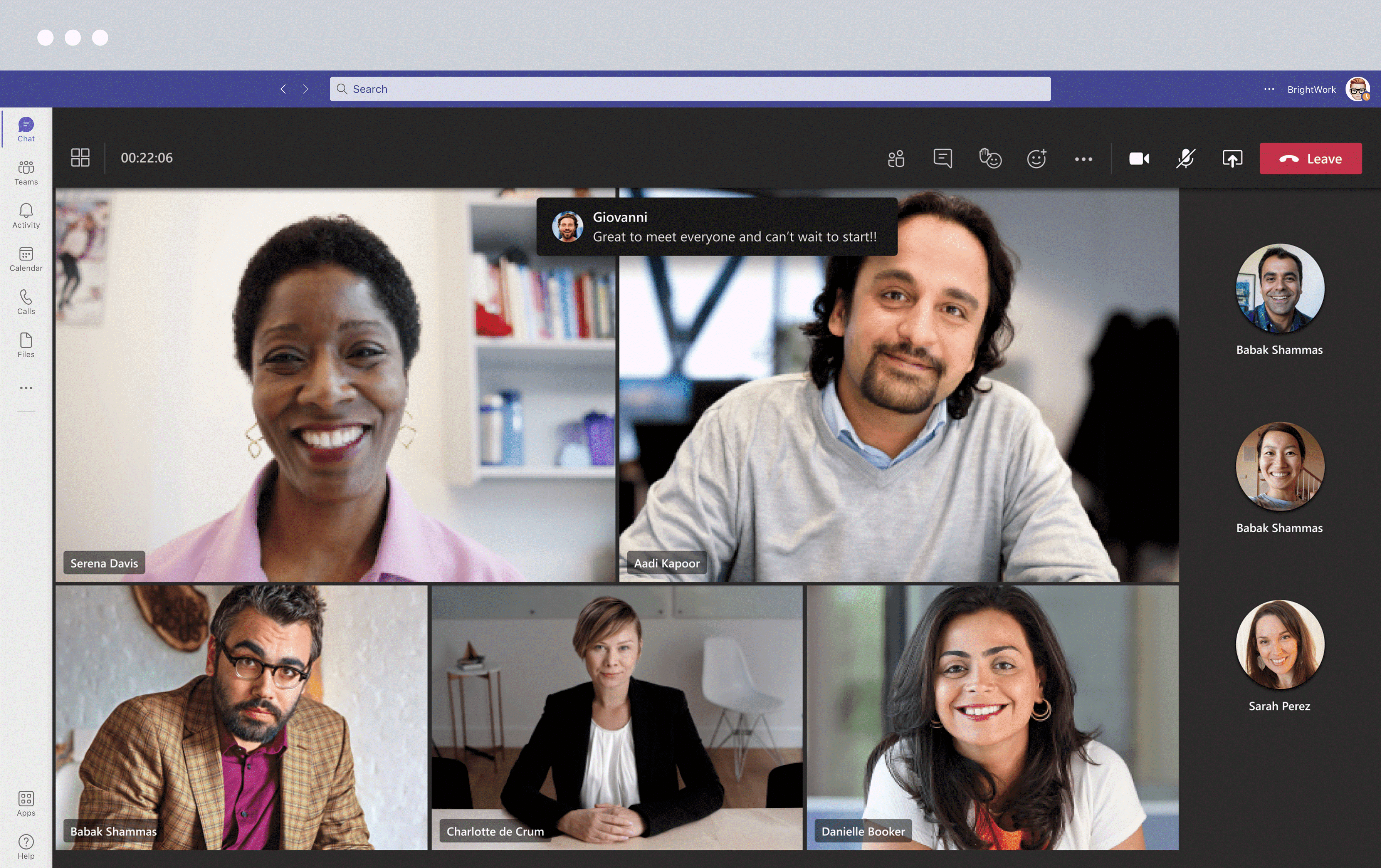In the digital-first world, project management is no longer confined to whiteboards and spreadsheets. With organizations increasingly relying on cloud-based tools to manage teams, tasks, and data, the importance of security and compliance in project management has never been more critical.
From data breaches and cyber threats to mounting regulatory requirements, project teams face a complex landscape where a single misstep can lead to operational disruption, hefty fines, and reputational damage. As a result, companies must adopt project management solutions that not only streamline workflows but also safeguard sensitive data and ensure compliance at every level.
Standardize your project management processes with Microsoft 365
Watch a demo of BrightWork 365 project and portfolio management templates for Microsoft 365, Power Platform, and Teams.

Why is Security Important in Project Management?
In project management, data flows through every stage—from initial planning and stakeholder communication to task execution and final reporting. With so much sensitive information being shared and stored, ensuring strong data security within project workflows is essential.
Without proper safeguards, project data is vulnerable to a range of threats, including unauthorized access, phishing attacks, and system breaches. These risks not only compromise the integrity of the project but can also expose organizations to legal and financial consequences, especially in regulated industries like healthcare, finance, and government.
Compliance with industry standards such as ISO 27001, GDPR, HIPAA, and others is no longer optional. These frameworks are designed to enforce best practices around data protection, risk management, and incident response. Organizations that fail to comply risk heavy fines, reputational damage, and loss of business.
To effectively manage these risks, many teams rely on secure, structured workflows that minimize manual errors and provide clear audit trails. Using a platform like BrightWork 365, which supports SharePoint workflow, helps enforce governance, automate routine tasks securely, and ensure consistent compliance with organizational policies.
Security in project management is not just about protecting data—it’s about enabling trust, continuity, and success at every step of the project lifecycle.
Common Security Challenges
Project management environments often deal with sensitive data, distributed teams, and a mix of internal and external collaborators. These dynamics can introduce a variety of security challenges:
- Data Breaches: Inadequate protection of project files, emails, and collaboration tools can result in the exposure of confidential information. Cyber attackers frequently target weak points in project systems, such as unsecured cloud storage or unencrypted communications.
- Unauthorized Access: Without strict access controls, unauthorized users can gain entry to sensitive project data. This is particularly risky in large organizations or in projects involving third-party vendors or contractors.
- Compliance Failures: Projects that don’t align with legal and regulatory requirements can lead to violations. This is often due to a lack of visibility, poor auditability, or the absence of standardized processes for data handling and retention.
Recognizing these challenges is the first step toward securing your project environment and protecting your organization from avoidable risks.
Impact of Non-Compliance on Project Outcomes
Ignoring security and compliance obligations can severely derail a project. The consequences include:
- Regulatory Penalties: Non-compliance with frameworks like GDPR or HIPAA can result in fines ranging from thousands to millions of dollars, depending on the severity and jurisdiction.
- Project Delays and Cost Overruns: Security incidents often require immediate response and remediation efforts that drain resources, distract teams, and delay delivery.
- Reputational Damage: When stakeholders lose trust in your organization’s ability to safeguard data, the damage can be long-lasting and difficult to repair.
- Loss of Business Opportunities: Many clients and partners require proof of compliance before engaging with a vendor or project team. Lacking these assurances can mean missed contracts or reduced competitiveness.
Compliance isn’t just about checking boxes—it’s about ensuring that projects can be delivered safely, reliably, and without disruption.
Security and Compliance Standards for Project Management
To manage the complex landscape of data protection and regulatory requirements, project managers must be familiar with key security and compliance frameworks. These standards provide guidelines for managing information securely, protecting privacy, and reducing risk across digital environments. While requirements vary by industry and region, several globally recognized standards stand out for their comprehensive approach to security and governance.
GDPR, HIPAA, and ISO 27001
- GDPR (General Data Protection Regulation): Applies to any organization handling data of EU citizens. It mandates strict controls over personal data processing, storage, and access. For project teams, this means integrating data privacy into workflows, securing data transfers, and ensuring transparency with data subjects.
- HIPAA (Health Insurance Portability and Accountability Act): Relevant to healthcare-related projects in the U.S., HIPAA requires strong safeguards for patient data, including encryption, access controls, and regular risk assessments. Projects involving health data must incorporate HIPAA-compliant practices from the outset.
- ISO 27001: An international standard for information security management systems (ISMS). It outlines best practices for identifying risks, applying security controls, and continuously improving data protection across the organization. Certification under ISO 27001 signals a strong commitment to cybersecurity.
NIST Cybersecurity and Data Governance
- NIST Cybersecurity Framework: Developed by the U.S. National Institute of Standards and Technology, this framework helps organizations identify, protect, detect, respond to, and recover from cybersecurity threats. It’s highly adaptable and supports risk-based decision-making.
- Data Governance under NIST Guidelines: NIST promotes a structured approach to managing data integrity, availability, and confidentiality. For project managers, adopting these guidelines ensures that data is not only secure but also used and shared responsibly throughout the project lifecycle.
How BrightWork 365 Enhances Security and Compliance
In an environment where organizations are expected to manage projects efficiently while also adhering to stringent security standards, BrightWork 365 provides a solution that delivers on both fronts. Built on the Microsoft Power Platform and integrated with Microsoft 365, BrightWork 365 offers enterprise-grade security and compliance features that support secure, scalable, and efficient project delivery.
For organizations operating in regulated industries or public sectors such as those managing government project management – these features are critical to ensuring data protection and regulatory adherence from project initiation through completion.
Data Encryption and Secure Access Controls
BrightWork 365 benefits from the robust security infrastructure of Microsoft 365 and Azure. All project data is encrypted both at rest and in transit, ensuring that sensitive information is shielded from unauthorized access and interception.
Microsoft’s advanced security framework provides capabilities such as Multi-Factor Authentication (MFA), conditional access policies, and threat detection, enabling BrightWork 365 users to operate in a secure digital environment. These features collectively reduce exposure to cyber threats while safeguarding your organization’s project data.
Role-Based Permissions and Identity Management
To further minimize security risks, BrightWork 365 employs role-based access controls (RBAC) that ensure users only have access to the information and tools they need based on their role within a project or team. This prevents data overexposure and helps enforce the principle of least privilege.
Integration with Microsoft Entra ID (formerly Azure Active Directory) enables centralized identity management, streamlining user provisioning, access auditing, and deprovisioning as needed. This makes it easy to manage security across both internal and external project collaborators, enhancing both security and efficiency.
Automated Compliance Reporting and Audit Trails
Staying compliant requires visibility and BrightWork 365 delivers. By leveraging Microsoft 365’s audit logs and compliance reporting tools, BrightWork 365 enables teams to monitor project activity, track data access, and respond quickly to compliance audits or incidents.
These audit trails are not only essential for meeting regulatory requirements such as GDPR or HIPAA, but they also provide valuable insights for internal governance and continuous improvement. With automated compliance tracking and customizable reporting options, BrightWork 365 helps organizations proactively manage risk and demonstrate accountability.
Preventing Data Loss and Cyber Threats
With growing volumes of sensitive data moving across digital project environments, preventing data loss and cyber threats has become a business-critical function. BrightWork 365 is designed to reduce security vulnerabilities and ensure that project data remains safe, accessible, and compliant. By adhering to stringent protocols outlined in its privacy statement, BrightWork 365 offers organizations a reliable framework to manage and secure sensitive project information.
Risk Assessment and Incident Response Features
BrightWork 365 empowers project managers with built-in risk assessment capabilities to proactively identify and mitigate potential threats. These tools allow teams to:
- Categorize risks based on severity and impact
- Assign ownership for mitigation tasks
- Track the status of risks across project phases
- Integrate risk logs into standard project reports
In tandem with Microsoft 365’s incident response capabilities, BrightWork 365 supports rapid detection and remediation of threats. Real-time alerts, audit trails, and access logs help teams respond efficiently to any security incident, minimizing downtime and reducing the potential for data loss.
Secure Cloud Storage and Data Backup Protocols
BrightWork 365 is hosted on Microsoft Azure, which means project data is protected by one of the most secure cloud infrastructures in the world. Features include:
- End-to-end encryption of data both in transit and at rest
- Geo-redundant data centers to ensure resilience and high availability
- Automated data backup and restore mechanisms to recover critical information swiftly
These measures collectively guard against data breaches, accidental deletions, and infrastructure failures, ensuring that organizations always have access to their essential project data when they need it most.
Integrating Compliance Tools and Security Alongside Brightwork 365
While BrightWork 365 delivers powerful out-of-the-box compliance and security features, it’s also designed to work seamlessly with additional compliance tools and services. Organizations in highly regulated industries such as those managing Healthcare Project Management benefit from combining BrightWork 365 with third-party solutions for auditing, legal hold, and advanced data governance.
Security Training for Project Teams
Technology alone isn’t enough—people play a key role in maintaining a secure project environment. BrightWork 365 supports ongoing security training and awareness by providing:
- User-specific permissions and onboarding guides
- Integration with Microsoft 365’s learning modules
- Built-in reminders and templates promoting data security best practices
When project teams understand the “why” behind compliance protocols, they’re more likely to follow them—reducing the risk of human error and strengthening the organization’s overall security posture.
Compliance Automation for Efficiency
Manual compliance tracking is not only inefficient—it increases the chance of errors and omissions. BrightWork 365 enhances operational efficiency with compliance automation tools that:
- Automatically log user activities for audit trails
- Generate compliance reports on demand
- Apply templates that align with regulatory standards such as GDPR, HIPAA, and ISO 27001
These automation features allow teams to spend less time on administrative tasks and more time on delivering successful projects—without compromising security or governance.
Ensuring Long-Term Security with BrightWork 365
In an era defined by digital transformation and increasing regulatory complexity, project security and compliance can no longer be treated as afterthoughts. Organizations must adopt tools that embed protection, privacy, and governance directly into their project workflows and BrightWork 365 delivers exactly that.
From robust data encryption and role-based access controls to automated compliance tracking, BrightWork 365 provides the security foundation modern project teams need. Its integration with Microsoft 365’s trusted ecosystem ensures that sensitive data is protected, accessible, and compliant with leading global standards like GDPR, HIPAA, ISO 27001, and NIST. BrightWork 365 empowers your teams to manage projects securely – today and into the future.
Get the highest security standards with Microsoft 365.
Collaborate securely with centralized data governance and control, with BrightWork 365




